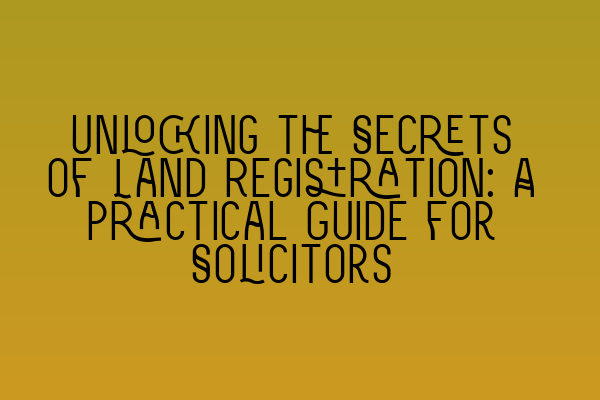Unlocking the Secrets of Land Registration: A Practical Guide for Solicitors
Welcome to SQE Property Law & Land Law! As solicitors specializing in property law, we understand the importance of having a solid understanding of land registration. It is the foundation upon which all property transactions are built. In this practical guide, we will unravel the intricacies of land registration and provide you with the tools you need to excel in this field.
Why is Land Registration Important?
Land registration serves as a crucial safeguard for property ownership. By registering land, the title and rights associated with it become legally recognized and protected. It provides certainty and clarity to property owners, purchasers, and mortgage lenders, facilitating smooth and secure transactions. As a solicitor, having a comprehensive knowledge of land registration is essential for providing your clients with the best legal advice and representation.
Understanding the Land Registration Process
The land registration process in the UK is governed by the Land Registration Act 2002. It is a complex procedure that involves a series of steps to register land, transfer ownership, and create legal charges. Let’s take a closer look at each step:
1. Application for Registration: The first step is to submit an application for registration to HM Land Registry. This can be done online or by post. It is crucial to ensure that all necessary documentation and information are included to avoid delays or rejection.
2. Examination and Validation: Once the application is received, HM Land Registry examines the documents to ensure that they meet the legal requirements for registration. This includes verifying the identity of the applicant, checking for any conflicting interests or restrictions, and confirming the accuracy of the description and boundaries of the land.
3. Official Searches: HM Land Registry conducts official searches to gather information on the property, such as planning permissions, rights of way, or restrictions. These searches help identify any potential issues that may affect the title or use of the land.
4. Registration Decision: After the examination and searches are completed, HM Land Registry makes a decision on whether to register the land or raise any concerns or requisitions. If there are concerns, the applicant is given an opportunity to address them. Once all requirements are met, the land is registered, and a title is issued.
5. Update the Charges Register: If there are any legal charges on the property, such as mortgages or leases, they must be registered on the Charges Register to protect the interests of the chargeholders.
Tips for Successful Land Registration
To streamline the land registration process and ensure a successful outcome, here are some valuable tips for solicitors:
1. Prepare Thoroughly: Invest time in carefully preparing the application and ensuring all necessary documentation is included. Missing or incomplete information can lead to delays or rejection.
2. Conduct Due Diligence: Perform detailed searches and investigations to uncover any potential issues that may affect the title or ownership rights of the property. This will help you anticipate and address any concerns raised by HM Land Registry.
3. Communicate Effectively: Maintain regular communication with your client, keeping them informed of the progress and any updates regarding the land registration process. Promptly address any queries or concerns they may have.
4. Stay Up to Date with Changes: Keep abreast of any changes or updates to land registration laws and regulations. Attend relevant seminars, workshops, or training programs to enhance your knowledge and understanding of the subject.
Unlock the Secrets of Land Registration
Land registration may seem like a daunting and complex process, but by following these practical guidelines, solicitors can efficiently navigate through it. At SQE Property Law & Land Law, we are committed to helping solicitors excel in their practice by providing expert guidance and support.
Expand your legal expertise even further by exploring our related articles:
1. Unraveling the Complexities of UK Bail Laws
2. Remand in Custody: Understanding Detention Prior to Trial
3. Appeals in Criminal Law: A Roadmap to Seeking Justice
4. Exclusion of Evidence: Understanding Grounds and Implications
5. Understanding Sentencing Guidelines in UK Criminal Cases
By continuously expanding your knowledge and staying informed about legal developments, you can become a leading expert in property law and provide exceptional service to your clients.
Unlock the secrets of land registration and reap the rewards of a successful legal practice. Contact SQE Property Law & Land Law today to learn more about our services and how we can support your professional growth.
